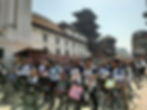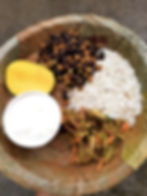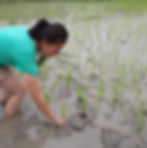We welcome new partners and cherish our network of friends and allies. Being a CCA ally means that your organization is sympathetic to our mission - please read the Carfree Manifesto - and you are open to cooperation and being a part of our network. You can receive our monthly newsletter and will be first in line to be invited to attend our conferences or join us on projects. There is no membership fee.
Please fill out this simple form to add yourself as an ally.
Build Back Better Cities Campaign

Shail Shrestha
28 aug 2023
How bicycles and localization are deeply interlinked
Text and pictures by Shail Shrestha and Niharika Mathema of Digo Bikas Institute and Carfree Cities Alliance
World Celebration Days are ways to highlight a cause, to collectively focus and bring important ideas to public attention in the community while uniting behind these globally. Several important days are packed into the month of June. These include World Bicycle Day, followed two days later by World Environment Day, and then World Localization Day. In Nepal these days were celebrated together, thus connecting their messages for a broader impact.
Here is an interesting fact: Who knew that the Turkmens (and Turkmen women) helped originate World Bicycle Day? “Adopted in 2018 through a UN General Assembly resolution spearheaded by the Government of Turkmenistan, World Bicycle Day(June 3) recognizes the uniqueness, longevity and versatility of the bicycle… a simple, affordable, reliable, clean and environmentally fit sustainable means of transport, fostering environmental stewardship and health. It encourages the use of the bicycle as a means of eradicating poverty; furthering sustainable development; strengthening education, including physical education, for children and young people; promoting health; preventing disease; and facilitating social inclusion and a culture of peace.“ (who.int)
World Localization Day (June 21) on the other hand is an annual celebration of the worldwide localization movement where localization refers to bringing the economy home, back to a human scale. “It is an invitation to see the world in a new way to gain an awareness of place by participating in small-scale, local economic exchanges and to create change locally as part of a global movement for healthier communities and economies” ( worldlocalicationday.org).
The bicycle as a means of transportation encourages localizing your destinations to meet your daily needs; that is, the bicycle is most useful as transport within a compact rather than sprawled city. The localization of the economy demands that the resources and services be produced and owned locally as much as possible. At a systems scale, the bicycle demands the inclusion of bicycle users in road design and for city planning to prioritize shorter distance commuting and mixed use of land. Localization demands settlements to be designed for people and not for cars and commerce. It demands city centers to be destinations, squares and public places that represent the spirit of the place, instead of road intersections and roundabouts. Mobility and economics thus define our relation to the land, life in it and its values.
Bicycles and localization may appear very different in their approach to resolving a cultural crisis of a resource-intense life-style that is dependent on energy intensive global systems and the constant movement of people and goods. A deeper dive into the matter makes us realize that transportation and the economy of a place are like the hardware and software of a single system.
In Dharan, Nepal, World Bicycle Day was marked with the celebration of the first bicycle lane of the city. A municipal-level consultation with a diverse community was organized to discuss sustainable and environment-friendly transport possibilities for Dharan. The consultation concluded with a recommendation of a broader long-term Transport Master Plan that includes a non-motorized transport strategy. Proposals such as traffic evaporation through service decentralization and self-sufficient local economy of neighborhoods (with market streets in each ward) were also discussed as a way to discourage traffic and the use of private vehicles. The lack of efficient public transport and its impact on food markets was also realized through the consultation. The recognition of a public transport plan that aims to connect farms with the city markets of the city to encourage the local economy was discussed for inclusion in the Transport Master Plan.

The traditional snack of rice flakes, fried beans, radish pickle, mango and curd for the celebration of World Localization Day.
In Dhankuta in the eastern hills of Nepal, the municipality organized a public event to connect youth with potential employees in the municipality, aiming to retain the youth population and prevent their emigration. The municipality also organized events to promote recipes with locally grown ingredients for school canteens and restaurants encouraging the use of local products. Consultations with stakeholders helped people to realize how the lack of local public transport within the city impacted farmers' access to local markets and thus forcing export of local farm products and encouraged food imports from out of the city. In Dhankuta the need for a municipal transport plan was realized to support local farmers and meet the needs of revitalization of the neighborhood market streets in the city.

Face paintings with themes of environment, planet and climate on the occasion of World Environment Day and World Bicycle Day event in Basantapur of Kathmandu.
In Kathmandu bike action on the theme “Cycling for Real Solutions To Climate Crisis" was organized to mark the occasion of World Bicycle Day and Environment Day 2023. Adding to the vibrancy of the event, a captivating flash mob entertained the public along with other fun activities like face painting and Dear Earth (Letter to the Earth). Face painting was a fun way to visually represent solidarity with environmental causes while Dear Earth allowed individuals to express their thoughts, concerns and hopes for the planet. These engaging activities encouraged active participation and sparked meaningful discourses.
The event successfully combined the elements of awareness, entertainment and engagement along with the participants’ collective efforts and enthusiasm, to serve as a reminder that every action, no matter how small, contributes to the larger goal of combating climate change and creating a more sustainable future.

Discussion on Localization of Economy after paddy plantation work and mud fun in the Paddy field in 30th June at Tarakeshwar in Kathmandu

Planting paddy in occasion of World Localization Day and National Paddy Day

Niharika Mathema of Digo Bikas Institute plants paddy in the field
On the occasion of the 20th Paddy Day 2080 and the 4th World Localization Day 2023, a rice planting program took place on Friday, 30th June at Tarakeshwar municipality in Kathmandu. This was an important occasion to reflect on and celebrate localization with informal open conversations and discussions in the paddy field with a diverse range of stakeholders on the present direction of our life and the economy, creating a platform for learning, sharing and collaboration. We tasked ourselves with providing an answer to what we can do about it.

Shail Shrestha of Digo Bikas Institute shares on the concept of Localization of Economy and how it deals with the youth emigration crisis in settlements of Nepal. The banner mentions ‘ Our Dreams: Food, Livelihood and Economic Localization’
The conversation focused on sustainable community-based initiatives, big picture activism and localization as a solution multiplier, shared through reflections from different municipalities. Conversations also explored how embracing local practices can contribute to cultural preservation and strengthen community bonds.
